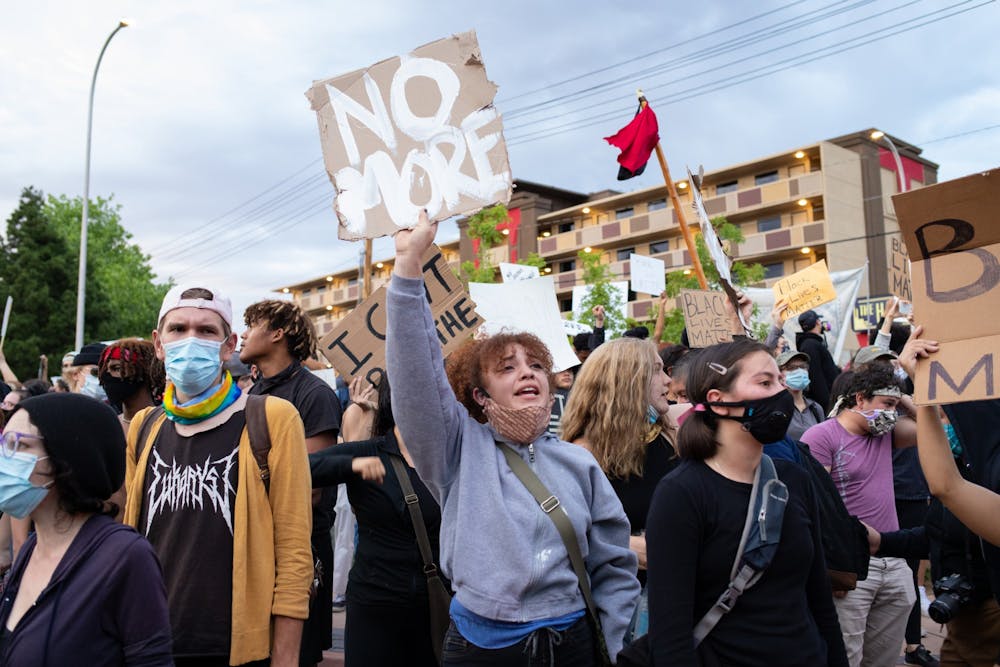In the majority of police brutality cases, officers are not criminally prosecuted, and reform advocates contend that is in part because of something called “qualified immunity.”
According to Merriam Webster, qualified immunity is “immunity from lawsuits that is granted to public officials (such as police officers) for acts that violate someone's civil rights if it can be shown that the acts do not violate clearly established statutory or constitutional rights of which a reasonable person would be aware.”
Eliminating qualified immunity emerged as a key demand during the protests that have swept the nation demanding justice for victims of police violence. The judicial doctrine is seen as a large obstacle for families of victims seeking justice for their loved ones.
According to state legislators who spoke with the Daily Lobo, qualified immunity is expected to be a focal point of debate during the upcoming 55th state legislative session after steps were taken last year with an eye on future reform.
During the first special legislative session held in June of last year, legislators claimed to have responded to constituent concerns by establishing the New Mexico Civil Rights Commision with the passage of a bill by the same name.
Since June, the commission has convened and specifically studied New Mexico’s qualified immunity statute.
On Nov. 20, the commission made an unprecedented recommendation urging the legislature to enact a New Mexico Civil Rights Act to specify qualified immunity cannot be used as a defense claim in court.
As it stands, in order for law enforcement officers to be convicted of police brutality the plaintiff must show that their constitutional rights have been violated and that the violation is recognized in “clearly established law.”
According to the commission, this means that even if a court recognizes that their rights have been violated, the victim will likely lose due to the strict requirements to find a virtually identical case to cite as precedent.
The commission’s report points out that qualified immunity “leads to the bizarre circumstance where, for example, someone who slips and falls on government property can (receive financial compensation) for their injuries, but a person who is denied any number of their fundamental rights under the state Constitution ... cannot.”
Barron Jones, senior policy strategist at the American Civil Liberties Union of New Mexico, said that passing a state Civil Rights Act would allow victims of police violence and their families to seek meaningful redress.
The Civil Rights Commission’s recommendation also offers reasonable attorney fees to those who prevail in lawsuits.
Get content from The Daily Lobo delivered to your inbox
“This creates an access to justice for marginalized people, since civil rights cases are often very expensive to litigate,” Jones said.
While the proposed Civil Rights Act would allow victims to recover financial compensation for their losses, it would also expressly prohibit an officer from receiving other forms of punishment — like suspension or license revokement — something advocates say could deter other officers from engaging in future brutality.
Furthermore, the commission stated that officers wouldn’t bear the personal responsibility for paying a judgement or settlement even if they were found at fault, raising questions of whether officers would face adequate punishment in the eyes of victims and advocates.
Jones said conservative politicians may also push for a termination clause, which would be a preset agreement defining circumstances for the dismissal of officers, including how much notice and payment. However, he remains optimistic that the act in some form will be passed this session.
During a Legislative Finance Committee (LFC) meeting on Dec. 8, several individuals, including Sheriff Kim Steward and Sen. Steven Neville, R-San Juan, raised concerns regarding the financial burden to counties and smaller municipalities.
The commission representatives said that they also investigated the fiscal impact of a state Civil Rights Act, specifically the cost of additional insurance policies, but were unable to quantify the actual costs.
Sen. George Muñoz, D-Gallup, also raised concerns at the LFC meeting regarding unnecessary lawsuits against officers, saying that involving counties in needless litigations does not solve the root disciplinary issue for the officers and instead creates larger financial burdens.
Unlike his other Democratic colleagues, Muñoz expressed doubt that a Civil Rights Act bill will pass in the upcoming session.
“This may take a couple years to work out and tweak out and see what happens,” Muñoz said.
Nikita Jaiswal is a freelance reporter at the Daily Lobo. She can be contacted at news@dailylobo.com or on Twitter @NikitaJswl






